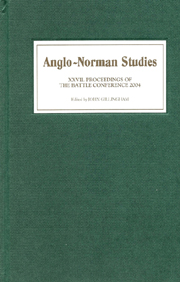Book contents
- Frontmatter
- Contents
- LIST OF ILLUSTRATIONS
- EDITOR'S PREFACE
- ABBREVIATIONS
- Probing the Passions of a Norman on Crusade: the Gesta Francorum et aliorum Hierosolimitanorum
- Gilbert Foliot et l'Ecriture, un exégète en politique
- Writing Warfare, Lordship and History: the Gesta Consulum Andegavorum's Account of the Battle of Alençon
- Anglo-French Peace Conferences in the Twelfth Century
- Peter of Blois and the Problem of the ‘Court’ in the Late Twelfth Century
- Normandy and Norman Identity in Southern Italian Chronicles
- Monastic Chronicles in the Twelfth-Century Abruzzi
- The Impact of Rebellion on Little Domesday
- Setting Things Straight: Law, Justice and Ethics in the Orationes of Lawrence of Durham
- The Angevin Kings and Canon Law: Episcopal Elections and the Loss of Normandy
- Zooarchaeology of the Norman Conquest
- Was Thomas Becket Chaste? Understanding Episodes in the Becket Lives
The Impact of Rebellion on Little Domesday
Published online by Cambridge University Press: 12 September 2012
- Frontmatter
- Contents
- LIST OF ILLUSTRATIONS
- EDITOR'S PREFACE
- ABBREVIATIONS
- Probing the Passions of a Norman on Crusade: the Gesta Francorum et aliorum Hierosolimitanorum
- Gilbert Foliot et l'Ecriture, un exégète en politique
- Writing Warfare, Lordship and History: the Gesta Consulum Andegavorum's Account of the Battle of Alençon
- Anglo-French Peace Conferences in the Twelfth Century
- Peter of Blois and the Problem of the ‘Court’ in the Late Twelfth Century
- Normandy and Norman Identity in Southern Italian Chronicles
- Monastic Chronicles in the Twelfth-Century Abruzzi
- The Impact of Rebellion on Little Domesday
- Setting Things Straight: Law, Justice and Ethics in the Orationes of Lawrence of Durham
- The Angevin Kings and Canon Law: Episcopal Elections and the Loss of Normandy
- Zooarchaeology of the Norman Conquest
- Was Thomas Becket Chaste? Understanding Episodes in the Becket Lives
Summary
In 2001 Stephen Baxter began his important paper on the representation of lordship and land tenure in Domesday Book, with a quote from the contemporary Inquisitio Eliensis: ‘Who held it in the time of King Edward, who holds it now?’ (‘Quis tenuit eam tempore Regis Edwardi, quis modo tenet?’). The fact that Domesday frequently provides information for two dates, one representing the position under the last acceptable (to the Norman compilers) English king and the other giving the position under William I in 1086, is part of what makes this text such a uniquely rich source. In this paper, I want to begin by looking at one of the sentences that follows that fundamental question in the Inquisitio prologue, specifically the instruction that: ‘All this to be given three times, namely in the time of King Edward, when King William gave it, and at the present time’ (‘Hoc totum tripliciter, scilicet tempore regis Æduardi, & quando Rex Willelmus dedit & qualiter modo sit’). This statement is given credence by the fact that Domesday Book does indeed often record values for three points in time, a fact that is well-known, but little studied.
The prologue from which these quotes are taken is not, of course, from Domesday itself, but from a contemporary collection of texts from the abbey of Ely related to the Domesday survey. Within this, a series of questions to be answered is given which is often taken to be those asked at the Domesday inquests themselves.
- Type
- Chapter
- Information
- Anglo-Norman Studies 27Proceedings of the Battle Conference 2004, pp. 132 - 150Publisher: Boydell & BrewerPrint publication year: 2005



